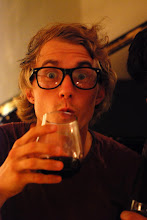Saturday, June 05, 2010
Heat.
Monday, April 05, 2010
A quote to get me going.
Sunday, March 21, 2010
Links.
Tuesday, March 02, 2010
The posture of success.
Sunday, February 21, 2010
In sickness and in health (and in being).
Sunday, January 03, 2010
The case for my hands. (incomplete)
When I was five, or small enough to process with 'kid logic', I aspired to be a garbage man. "Trash man," "rubbish man," "waste management," call it what you want. It is all the same. I remember watching a large truck swing to a rocking halt at the side of our house in suburban Lockport, Illinois. It roared to a stop and a man jumped off the back from his perch. Overalls, a t-shirt, and gloves. To me this was glory.
I was a simple child.
From the driveway, I dreamed of wearing those gloves and overalls. In my five year old mind, the most essential work was performed with gloves on. I dreamed of holding onto the back of that truck and riding through the neighborhood. I would see everyone, and they would see me; standing in the open air, perched on a moving vehicle.
Was there a degree of predictability in this choice?
Though I never made it to the herald of garbage men, I have pursued labor jobs and have been grateful for them. I believe they complement everything I have done.
All of us go through a process of socialization. Action and reaction based on upbringing and an infinite number of other factors. My father was a laborer; a diesel mechanic, a carpenter, an engineer, a technician, and now a manager. His father, a soldier in Guadacanal. My mother, a stay-at-home mom and homecare nurse; proud of both jobs. I, in turn, am thankful. Both parents educated me in their ways; indirectly through their actions, and directly through their words. Or maybe that works both ways. Neither of them were academics in the strict sense. But the fact that I exist here at Tel Aviv University is surely connected to their prodding and instruction.
Of my generation, I am the first in my extended family to finish a bachelor's degree. I am the first to join an M.A. program. And maybe, I will be the first to finish. This first of education does not add to my inherent worth, or take away from anyone else's. I approach it only from a point of socialization.
Looking at my family history I can see why I would dream of labor. Becoming a garbageman, a fireman, or even a mechanic. Not everyone looks at grease with attraction, or can become absorbed with the smell of sawdust, but sometimes I do. Matthew B. Crawford argues for the beauty and intelligence of working hands.
There is intelligence in the labor of hands.
I found this in firefighting. Processing on the go. Watching the sky for falling ash. Or casting an upwards glance at dropping limbs; slow rocking widowmakers. Action: deliberate, measurable action. Once I overcame the first couple months of muscle strains, blisters and exhaustion, I took my place and loved the work. It grew on me progressively. Waking at 5AM to string my boot laces through golden hooks. Smelling smoke on my shirt. Stuffing food in my mouth, and pushing line all day long. Digging, moving through the forest at 7,000 feet. Becoming comfortable enough to chew sunflower seeds, while spitting the shells between swings, and still remembering to breathe.
I will always have a connection to the fire world.
In a way, this past year I returned to the labor of my hands. Looking for cash and a comfortable schedule, I found a simple summer job--park district maintenance. I was utility man. I did anything. Cleaning lawnmowers, fixing fences, dragging baseball diamonds, weeding flowerbeds, trimming tree limbs, basic PVC plumbing, painting field markers (I paint a crooked line), digging random trenches, and even boating across placid subdivision ponds and throwing dust in the air. I laughed a lot this summer, and even made some friends.
Today I am physically far from these worlds. As much as I loved the demanding simplicity, I needed more. And this is why I'm a student? "Give it time," I tell myself. I have a unique opportunity and I carry it with responsibility. For now, I exercise my mind, yet I hope to someday return to my hands, at least in part.
I have not lost the calluses yet.

